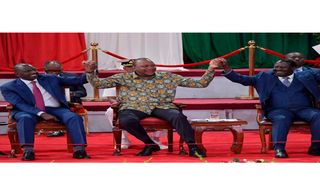
From left: Former President Uhuru Kenyatta, his then deputy William Ruto and Azimio leader Raila Odinga.
| File | Nation Media GroupOur Columnists
Premium
Why political deals are a stumbling block to Kenya’s progress
It is over one year now since Kenya concluded the 2022 elections that brought the Kenya Kwanza Alliance into power.
The public protests organised by the Azimio la Umoja One Kenya Coalition also ended after the government agreed to dialogue on how to address the opposition’s complaints.
In fact, the National Dialogue Committee has already unveiled its report with recommendations touching several issues that informed the protests.
The committee proposes to address the interests of the political elite—both in the opposition and in government—by establishing additional posts. Of course this is what satisfies Kenya’s and generally Africa’s political elite.
Our politics is about patronage and pork-barrel; undertaking interventions only meant to generate support. Indeed, it is the interests of the political elite to always pulls the country back, particularly so when those who lose election are powerful enough to mobilise their strongholds against the winning party.
The influence of politically powerful individuals potentially threatens the legitimacy of any new government. This, therefore forces a new government to seek ways to include them—formally and informally—in the new power arrangements.
Because of this, elite consensus and “handshake” have become so central in Kenya’s politics that it is predictable what would happen after every presidential election. Indirect demands for inclusion in new power arrangements begin to come up immediately after elections.
The consensus reached by the elite has consequences on the governance and development of the country. It constrains the rule of law and makes it difficult to control graft.
Government policies and regulations generally become difficult to effectively implement and the bureaucracy is filled with lethargy because rules become subject to political considerations.
The political deals tend to weaken the rule of law and the extent to which the law is applied and respected. And because the deals are about protecting interests, the elite always seek to protect their loyalists by threatening to pull out of the “deal” if any of their own is subjected to the law.
Contracts, whether written or oral, become subject to political interpretation rather than judicial judgment.
A case in point is the saga of the Sh17 billion imported fuel. The matter became a subject of political altercation between the government and opposition, with each side appearing to support certain interests.
This shows that political authority can be used to deprive, expropriate or even allocate someone’s assets based on political consideration. Contracts can be altered and the law applied disproportionately to fit within the prevailing political circumstances.
If the government is not in favour of any of the parties in the contract, it can easily withdraw from it and get back when the elite are convinced that the contract can address their interests.
Attempts to have contract disputes arbitrated in courts also face political challenges as judgments and court orders are not enforced.
After all, those responsible for enforcement are part of the patronage value chain. Police and other security agencies, for example, cannot enforce the laws because they themselves are controlled by those at the centre of political deals.
In this way, political deals undermine the basic foundations of governance.
Political deals also slow down or completely hamper measures to control corruption, and lead to capture of public institutions. In fact, this is one space that those in government and opposition find common ground.
Those in the opposition demand and are enticed with access to public resources. And once they are “full”, they stop playing their oversight role. Those in government know this very well—that the opposition elite need their interests to be addressed as individuals and they will be quiet.
Addressing their interests leads to a political calm that allows the corrupt to continue the practice.
Further, political deals make it difficult to attract investment. The deals are about arm-twisting those in power to accommodate those outside the new power arrangement.
This breeds conditions in which foreign and even local corporations face unrealistic or corrupt demands as they seek to conduct business. Securing government contracts, for example, becomes about being in step with the new political arrangements.
Winning the contacts for development projects is subject to political negotiations with the elite on both sides of the divide—they have to agree on what and how to share.
Foreign direct investments reduce because companies find it difficult to operate in an environment where they face demands that cost much more than the productive potential of the businesses they want to establish.
Political deals also have consequences on enforcement of regulations and policies. Instead of crafting policies and regulations that promote private sector development, the deals may lead to a regulatory burden on businesses.
Policies and regulations are made with a focus on how the deal makers will benefit. Without oversight by the opposition, operating businesses becomes expensive because the regulations made do not incentivise businesses.
What is required to move in the right direction, on account of these challenges, is vigilance by citizen groups and others with agency. But putting pressure on the government and opposition to do the right thing and to right their own wrongs is not a walk in the park.
- Prof Kanyinga is based at the Institute for Development Studies, University of Nairobi, [email protected], @karutikk





